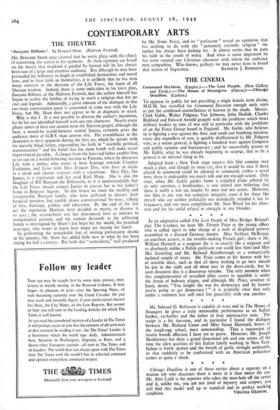CONTEMPORARY ARTS
THE THEATRE
• Buoyant Billions '. By Bernard Shaw. (Malvern Festival).
MR. BERNARD Strew once claimed that he wrote plays with the object of converting the nation to his opinions. As these opinions arc based on the theory that mankind is guided by human will he has always been sure of a large and attentive audience. But although he may have persuaded his followers to laugh at established institutions and moral laws, and to have faith in themselves, it is unlikely that he has won many converts to the doctrine of the Life Force, the fount of all Shavian wisdom. Indeed, there is some indication in his latest play, Buoyant Billions, at the Malvern Festival, that the author himself has begun to realise the futility of trying to teach a religion that has no rites and legends. Admittedly, a great amount of the dialogue in this two-hour conversation piece is concerned in some way with the Life Force, but Mr. Shaw does not appear to be as dogmatic as usual. Why is this ? It is not possible to discern the author's intentions, for he has not identified himself with any one character. Nearly every player utters at least one maxim from the Shavian gospel, although the hero, a would-be world-betterer named Junius, certainly gives the audience more of G.B.S. than anyone else. His resemblance to the dramatist is most apparent during the first act, which he spends with his morally blind father, expounding his faith in " scientific political_ reconstruction" and his belief that the atom bomb will make social Improvement possible. A cheque from the harassed father enables him to set out on a world-bettering mission to Panama, where he discusses Life with a native, who seems to have leanings towards Creative Evolution, and Love with Miss Frances Day, who lives in slacks in a shack and charms serpents with a saxophone. Miss Day, like Junius, is a vegetarian and has read Karl Marx. She is also the daughter of Bill Buoyant the Billionaire, so it is understandable that the Life Force should compel Junius to pursue her to her father's home in Belgravc Square. In this house we meet the wealthy and irresponsible Buoyant family, who have gathered to discuss their financial position, but ramble down conversational by-ways, talking of love, marriage, politics and education. By the end of the last act the vegetarian Marxists have decided to marry, as divorce is so easy ; the second-born son has denounced love as inferior to mathematical passion, and the curtain descends as the jabbering family is interrupted by Shaw's last hope for the world, the practical teen-ager, who wants to know how many are staying for lunch.
In performing the remarkable feat of writing provocative drama in his nineties, Mr. Shaw has added little new to what he has been aying for half a century. But both this " comedietta," well produced
by Mr. Esme Percy, and its " prefacette " reveal an optimism that has nothing to do with the " genuinely scientific religion " the author has always been looking for. It almost seems that he puts his faith in the youth of today. And what is more important he has even created one Christian character with whom the audience may sympathise. Who knows, perhaps we may never have to breed






























 Previous page
Previous page